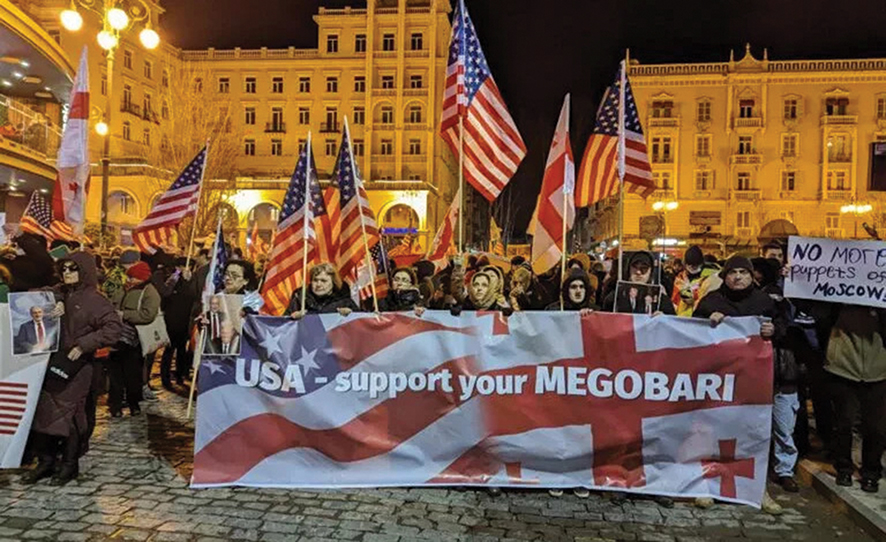The US House of Representatives this week overwhelmingly passed the MEGOBARI Act—a landmark, bipartisan sanctions bill aimed at supporting democracy in Georgia and holding accountable those responsible for democratic backsliding and human rights abuses. The bill, whose name stands for Mobilizing and Enhancing Georgia’s Options for Building Accountability, Resilience, and Independence, now awaits consideration in the Senate.
Backed by 349 lawmakers across party lines, the MEGOBARI Act targets high-level officials in the ruling Georgian Dream party, signaling growing alarm in Washington over Tbilisi’s authoritarian drift and increasing alignment with Russia.
“This is a clear message to the Georgian people,” said Senator Jeanne Shaheen. “We support their efforts to preserve a democratic future. The Act provides for sanctions against those who tried to crack down on peaceful demonstrations—it has strong bipartisan support.”
A Turning Point in US-Georgia Relations
First introduced by Congressman Joe Wilson and reintroduced by Reps. Steve Cohen (Democrat), Richard Hudson (Republican), and Marc Veasey (Democrat), the MEGOBARI Act reflects Washington’s sharp response to Tbilisi’s recent crackdowns on civil society and its increasingly anti-Western rhetoric.
Key provisions of the Act include:
• Sanctions on Georgian officials and enablers responsible for corruption, democratic erosion, and authoritarian influence.
• Suspension of aid pending a full review of US–Georgia cooperation.
• Creation of a Democracy Monitoring Task Force to assess the integrity of Georgia’s future elections.
• Support for Georgian civil society and independent media, emphasizing the US commitment to democratic values.
The bill also requires intelligence assessments on Russian and Chinese influence in Georgia and addresses sanctions evasion and transnational corruption.

Zurabishvili: “Georgia Is Entering Isolation”
Georgia’s 5th President, Salome Zurabishvili, welcomed the Act as a serious but necessary step, placing full responsibility for the current crisis on Bidzina Ivanishvili, the billionaire founder of Georgian Dream.
“This is a profound political crisis. Georgia is entering isolation from its main international partners. The MEGOBARI Act shows that the world sees what Georgian Dream and Ivanishvili are doing—and it cannot continue,” she declared in a statement.
“This regime deserves sanctions. A change of government is the only way forward. The moment this regime falls, we will restore our friendship with America and reclaim our place in the European community.”
Zurabishvili called for early elections, describing them as a peaceful and constitutional way out of the deadlock.
Georgian Dream: “Hostile Act” from a Divided America
The ruling Georgian Dream party has fiercely rejected the bill. Prime Minister Irakli Kobakhidze labeled it “blackmail” and called it the “DAUDZINEBELI Act” (Georgian for “hostile”). He accused US lawmakers of siding with Georgia’s “radical opposition” and of interfering in the country’s sovereignty.
“This is not a friendly law. It is openly hostile and will only harm US–Georgia relations,” Kobakhidze said. “It reflects the struggle within America itself, between President Trump’s supporters and the so-called ‘deep state.’”
Speaker of Parliament Shalva Papuashvili echoed the dismissive tone, claiming the Act was “political theater” aimed at stirring briefings by opposition-aligned NGOs and creating “hysteria” within Georgian politics.
Bipartisan US Support “For the People of Georgia”
Despite these denials, the bipartisan support behind the bill suggests the opposite: a coordinated, values-driven move by the US to support Georgia’s people, not its ruling elite.
A coalition of Georgian opposition parties and civil society organizations praised the Act, calling it “a powerful message of support for Georgia’s pro-European future.”
“This legislation shows the world does not accept Georgian Dream’s authoritarian course,” the Coalition for Change said. “With this vote, the US has taken an unprecedented step at the legislative level against an anti-democratic regime in Georgia.”
What’s Next?
The MEGOBARI Act will now proceed to the US Senate, where it is expected to receive similar bipartisan backing. If passed, it would formally trigger sanctions and implement strict conditions for future US engagement with Georgia’s government.
Meanwhile, political tensions in Tbilisi continue to escalate. A large-scale protest is expected on May 9, coinciding with Europe Day celebrations and echoing last year’s mass mobilization. Demonstrators are expected to march in defense of democracy, media freedom, and Georgia’s pro-Western orientation.
By Team GT














